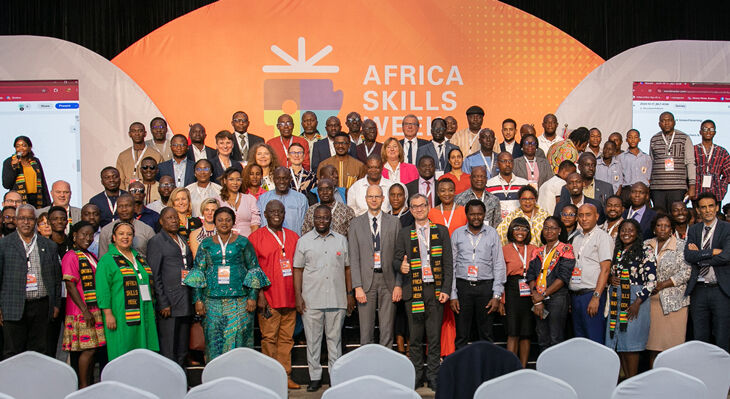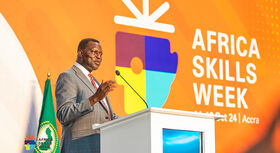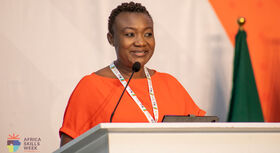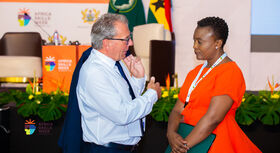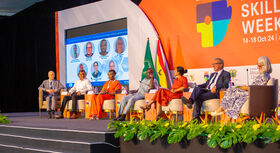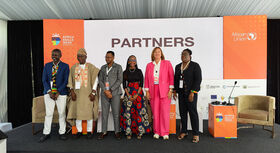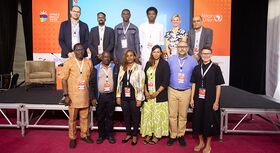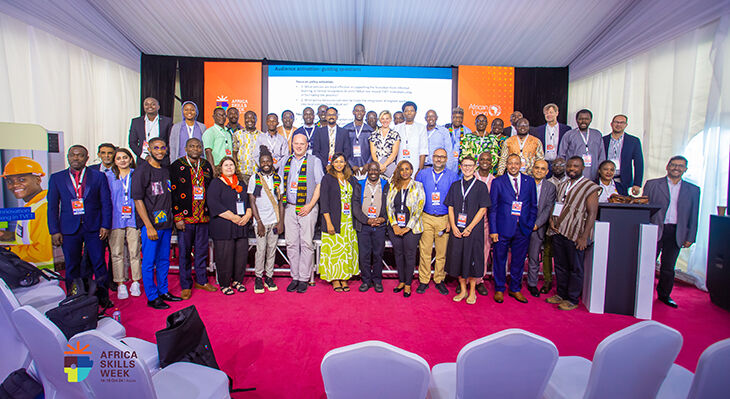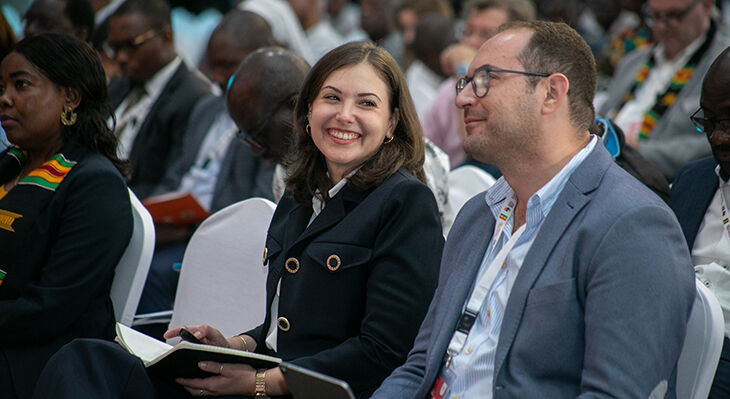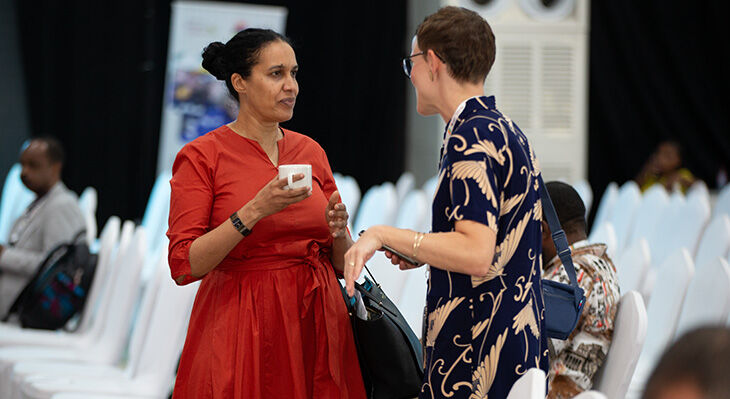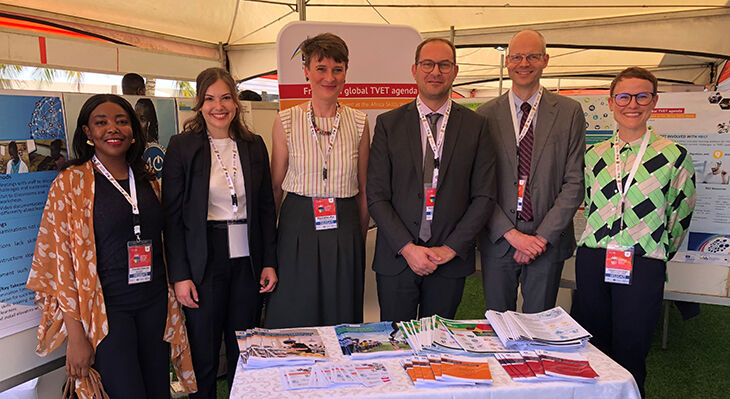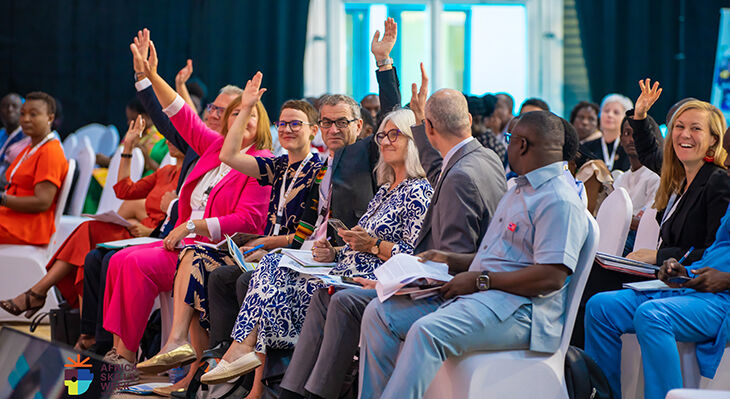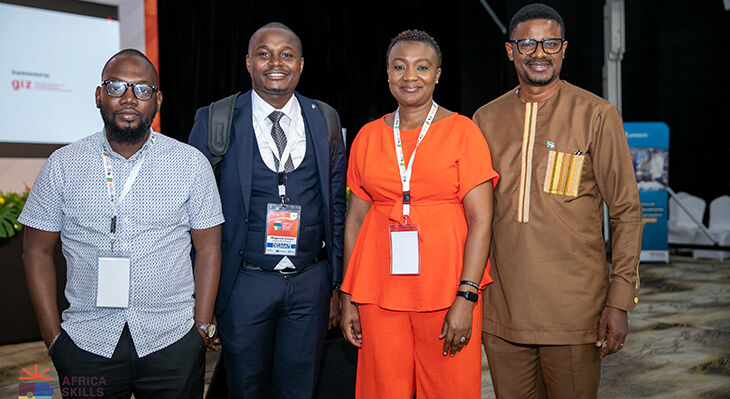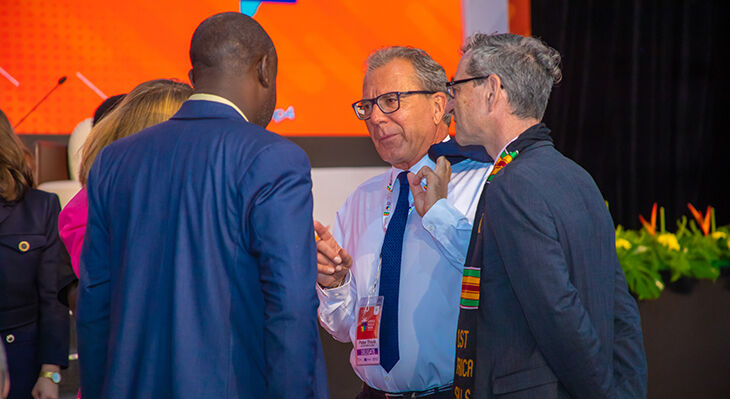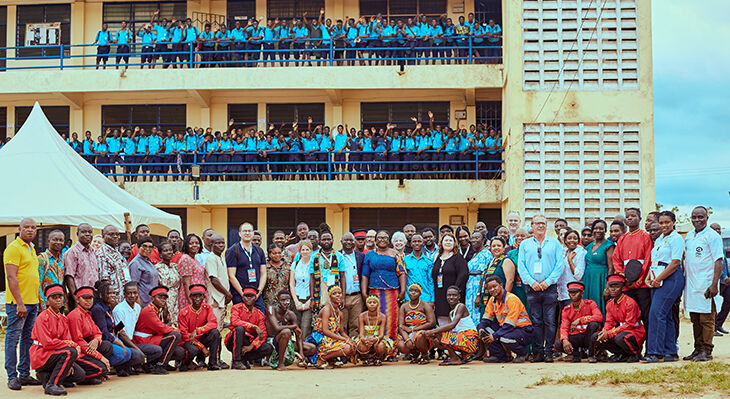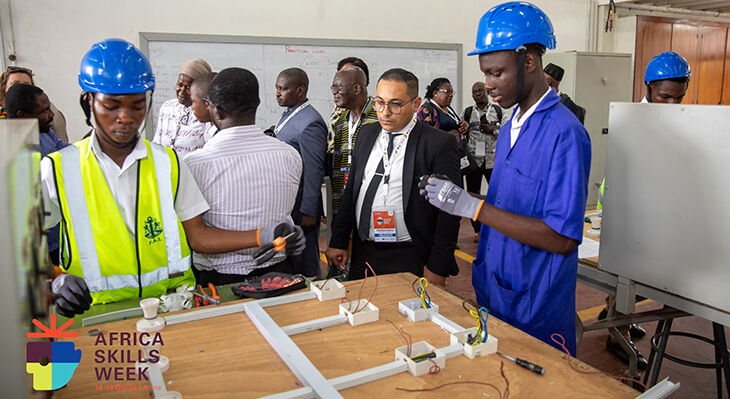Africa Skills Week: Endorsing a Global TVET Agenda
14 - 17 October 2024
11.11.2024
The first ever African Union Africa Skills Week was a great success. The BILT Bridging Event confirmed the relevance of a global TVET agenda. The call for joint action and strategic engagement on common priorities, especially between multilateral organisations, received broad support from African and international partners. The Federal Ministry of Education and Research (BMBF) is shaping the agenda process for the future of vocational education and training as part of its Excellence Initiative for Vocational Education and Training.
The BILT Bridging Africa Regional Conference, Framing a global TVET agenda: BILT Bridging Event at the Africa Skills Week, took place this past week. The event in Accra, Ghana ran from 14 to 17 October. This BILT Bridging Conference was held concurrently with the Africa Union’s Africa Skills Week and was hosted by a long-standing BIBB partner, the Ghanaian Commission for Technical and Vocational Education and Training (CTVET). Around 50 participants from the BILT community mingled with around 500 guests from the African Union and its partners.
Akwaaba – Welcome to Ghana
Africa Skills Week began with insights into vocational training practices and the perspectives of young people. A total of seven vocational schools in Accra and the surrounding area opened their doors to visitor groups. Numerous trainees were also actively involved throughout the event programme. It was made clear that the reality of young people matters and should be the starting point for the political discussions that followed during the week.
African Perspectives – High-Level Contributions
During the opening ceremony, the African Union Commissioner for Education, Science, Technology and Innovation, Professor Mohammed Belhocine, delivered two key messages.
Firstly, Africa holds the key to the workforce of tomorrow, not just for the continent, but for the entire world. The United Nations Economic Commission for Africa (UNECA) predicts that by 2050, one in three young people globally will be African, and Africa will account for almost 25% of the world’s workforce.
On the other hand, Commissioner Belhocine pointed out that the potential of women and girls is not being used. The Ghanaian Minister of Education, Dr Yaw Osei Aduntwum, also took up this issue in his speech: Ghana is currently investing in STEM schools for girls. In general, more focus should be placed on the STEM sector and on digital skills. Vocational training becomes more attractive with modern learning facilities.
Among one of the achievements already implemented in Ghana, he mentioned the “Free TVET” programme. The programme eliminates costs for school, food, textbooks and accommodation. Access to vocational training has improved enormously as a result and the numbers have increased accordingly. (For detailed information on vocational training in Ghana, see resources in the box on the right.)
During an inter-ministerial dialogue, which included representatives from Sierra Leone, Uganda, Libya, and Ghana, the following priorities for the design of vocational education and training were mentioned:
- Attractiveness and inclusiveness of TVET: There is a need for better marketing and incentivisation. More specifically, support measures to encourage more young people, especially women and girls, to take up training are needed. A recurring theme was the inclusion of the informal sector and the approximately 80% of employees who work outside the formal system.
- Quality and capacity building: Improving quality goes hand in hand with improving the qualifications of teachers. The establishment of institutions, including new centres of excellence, cooperation with the private sector and international partners were mentioned.
- Financing and infrastructure: Sustainable financing of vocational training remains a key challenge. This affects the government bodies involved, the training institutions and teachers, as well as the support of learners.
- National and regional cooperation: Improving inter-ministerial coordination and strengthening regional cooperation were cited as important measures to address the challenges more effectively.
A subsequent panel on the development of TVET in Africa in cooperation with international partners deepened the discussion of the challenges. Peter Thiele, Head of Division at the BMBF, brought the German perspective, alongside contributions from the African Union Development Agency (AUDA-NEPAD), the African Development Bank (AfDB), UNESCO, and the ILO, among others. Thiele emphasised Germany’s interest in international cooperation on an equal footing and the potential that lies in global partnerships with shared priorities and a strategic focus on pressing issues – such as skilled workers, digitalisation, and decarbonisation. The idea of a global TVET agenda should be understood and shaped in this context. In addition, he cited Germany’s participation in the OECD project to develop a vocational training PISA (OECD VET PISA) and WorldSkills Africa as examples of the importance of common standards in TVET.
African Union’s new continental strategy for TVET
The African Union (AU) concluded the high-profile conference day by providing insight into the revision of its current continental strategy for vocational education and training. The aim of the new Continental TVET Strategy 2025–2034 is to support member states in developing systems for high-quality, relevant and inclusive vocational education and training. Sophia Ashipala, Head of the Education Department of the African Union Commission, particularly emphasised that specific issues and the insufficient participation of the private sector in vocational education and training must be addressed. Digitalisation and sustainability remain core issues. In terms of inclusion, in addition to women and girls, target groups such as school dropouts and refugees should be given greater attention. The AU is proactively addressing the insufficient awareness of the previous strategy, and the lack of cooperation between ministries and member states. The strategy will be discussed in detail at a ministerial meeting at the beginning of November.
BILT Event: Support for a global TVET agenda
The central day of the BILT event was dedicated to the exchange on the global TVET agenda and the question of how strategic cooperation on common priorities in TVET can be strengthened: Framing a global TVET agenda.
Fred Kyei Asamoah, General Director of the Commission for Technical and Vocational Education and Training (CTVET); Friedrich Hübler, Director of UNESCO-UNEVOC; and Birgit Thomann, Head of the International Department at BIBB opened the day. Ms Thomann emphasised that the development of a global TVET agenda represents a shared commitment to strengthening international cooperation in policy, research and practice – a relay race with international partners in which BIBB is ready to take the baton and take the next steps.
Keynotes: TVET for the 21st Century – African perspectives and a global TVET agenda
In his keynote speech, Peter Thiele highlighted the importance of a coherent and strategic international vocational training cooperation as a core objective of a global TVET agenda in order to tackle common challenges more efficiently. Germany, located in the middle of Europe, with nine neighbouring countries, an ageing population and limited natural resources, is particularly dependent on such partnerships. Thiele stressed that such cooperation must always take place on an equal footing and focus on mutual learning. Cooperation with multilateral organisations such as UNESCO-UNEVOC, the OECD, the European Commission, the ILO, and the ETF is particularly important.
Increased global cooperation through a global TVET agenda was stressed by Thiele. This is both a central goal for the BMBF and a way to uphold the third pillar of its Excellence Initiative for Vocational Education and Training, which focuses on internationalisation. Existing cooperation, the identification of regional contact points, and the expansion of initiatives such as BILT will create solid foundations to promote interregional exchange and establish sustainable, high-quality vocational education systems worldwide.
Sophia Ashipala also addressed thematic common denominators for a global TVET agenda. She sees the need to equip learners with skills that are directly tailored to the needs of the labour market as a central point. In addition, she emphasised the importance of inclusive education, which ensures that marginalised and disadvantaged groups also have access to vocational education and training. She also focused on integration of digital skills into all training programmes to ensure that learners are prepared for a digitalised world of work.
Ashipala pointed to other key challenges, such as making VET more attractive, expanding cooperation with the private sector, and promoting sustainable development. To conclude, she stressed that “Africa will not only help shape the process towards a global TVET agenda, but will lead it.”
Panel discussion – shared priorities
A panel discussion, including audience participation, consolidated shared themes relevant to a global TVET agenda:
- Coherence: strengthen national, regional and multilateral approaches
- Evidence-based policy-making: via more research and data collection on vocational education
- Sustainable funding: ensuring long-term support
- Digital and green transformation: as key challenges
- Attractiveness and excellence: setting up regional centres of excellence
- Inclusion and gender equality: promoting equal access for all genders and marginalised groups
- Cooperation with the private sector: promoting work-based and market-oriented learning
- Handling of the informal vocational education sector: expanding offers for the recognition of prior learning (RPL) and using microcredentials as a means of integration
- Creating common ground: strengthening existing structures with the aim of building a network of regional contact points for inclusive transfer and innovation processes
The panel and audience agreed that structured exchange and a shared commitment to excellence and relevance are crucial to sustainably transforming TVET systems worldwide.
A highlight of the afternoon was the keynote speech by El Iza Mohamedou, Head of the OECD Centre of Skills. She took up key points from the panel discussion and underlined the importance of evidence-based policy-making. She called for the initiation of joint research projects and the creation of innovative platforms for the exchange of data and resources in order to increase the attractiveness and effectiveness of TVET, stating “We are changing the narrative about TVET through data.” (presentation under "LINKS").
ILO Session: Trailblazer – Quality TVET
Birgit Thomann, Head of the International Department at BIBB, spoke as an expert in a parallel session organised by the International Labour Organization (ILO) on the question of how the development of high-quality vocational training in Africa can be supported. What can BIBB contribute from its experience in international cooperation? She particularly addressed the cooperation between Ghana and Germany, in which GOVET supports the development of a monitoring and reporting system for vocational training and the institutional development of its partner CTVET.
BILT Expert Group on Building and Construction
The current BILT Expert Group on Building and Construction had its second in-person meeting in Accra this week. The focus was on the recognition of prior learning (RPL). To start, two successful approaches were presented: from Kenya (see presentation by the National Federation of Jua Kali Associations) and from Ethiopia (see presentation by the Ministry of Labour and Science). A panel discussion also brought in perspectives on RPL in the context of working with refugees (via UNHCR) and with those who are particularly structurally disadvantaged (via Don Bosco). The audience participated actively and questions were aimed in particular at the specific implementation in cooperation with training institutions and the informal sector, as well as intersections with the theme of migration.
Outlook
The next BILT Bridging Event will take place in Asia in 2025. Additionally, the BILT Expert Group remains active and additional BILT online webinars are currently being planned for 2024/2025.
Please subscribe to our newsletter to stay informed about upcoming events and participation opportunities (see links).
